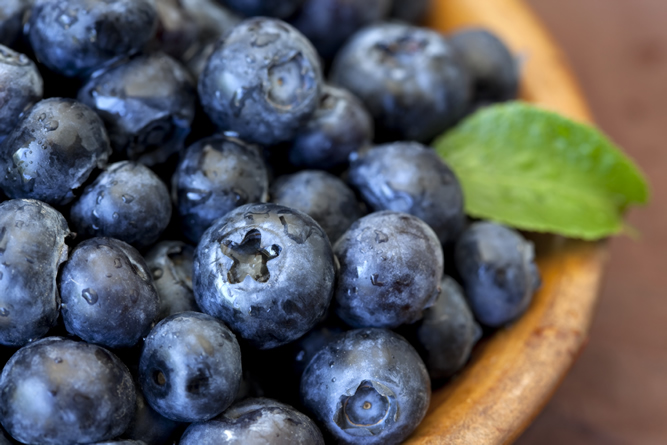A.Vogel search
When the internal search is activated, personal data such as your IP address is transmitted to our search engine Cludo. Data is thus transferred to a third country. Please click here if you want to display the internal search. You can find more information on data protection here: Privacy policy.
Blueberries
Blueberries are small fruits native to North America, they grow wild along the ground. Cultivated blueberries rather grow on shrubs of varying height. They often find their way into the popular blueberry muffins, but in fact are an underestimated ingredient. Blueberries are beginning to be considered as a superfood, as they are full of antioxidants and vitamins.

An Introduction to Blueberries
Blueberries are part of the Ericaceae family, and are closely related to cranberries. The berries are 5-16mm in diameter, deep purple or blue in colour, and range from being very sweet to very acidic depending on the ripeness and variety of fruit.
The growing season for blueberries is affected by climate and soil conditions, meaning that blueberries are in season at different times, depending where they are being grown. In Canada, the peak season is mid-July to end of August, whereas in Chile the growing season is November to April. Due to this, blueberries are available throughout most of the year.
Varieties of Blueberries
 As with virtually any fruit, there are many varieties of blueberries, each with their own characteristics. Blueberry plants can largely be split into three main groups – high bush, low bush and hybrid.
As with virtually any fruit, there are many varieties of blueberries, each with their own characteristics. Blueberry plants can largely be split into three main groups – high bush, low bush and hybrid.
Low bush or northern high bush varieties are slightly more tolerant of cold weather than higher plants. Duke blueberries and Bluecrop are types of northern high bushes. Duke plants produce medium sized berries, fairly early on in the growing season. Bluecrop are the most widely grown blueberries worldwide, as it is a hardier plant than other blueberry varieties, and produces well-flavoured berries.
Nutritional information
 Blueberries are more and more being seen as a superfood, largely because they are high in anti-oxidants, Vitamin C and K, iron and manganese. They are also low in saturated fat, sodium and cholesterol. The nutrients available from blueberries is unaltered whether the fruit is raw or frozen. However, cooking them at temperatures above 175ᵒC reduces enzyme activity and vitamin and mineral content.
Blueberries are more and more being seen as a superfood, largely because they are high in anti-oxidants, Vitamin C and K, iron and manganese. They are also low in saturated fat, sodium and cholesterol. The nutrients available from blueberries is unaltered whether the fruit is raw or frozen. However, cooking them at temperatures above 175ᵒC reduces enzyme activity and vitamin and mineral content.
100g serving:
57 kcal, 0.8g protein, 0.3g fat, 14.5g carbohydrate, 2.4g fibre
Health benefits
 The anti-oxidants in blueberries have many recognised health benefits, and research has been carried out on the effects that they have on the cardiovascular system. Blueberries have been found to improve the balance of cholesterol levels by lowering bad cholesterol and increasing good cholesterol. Regular consumption of blueberries has also been found to promote good blood pressure levels.
The anti-oxidants in blueberries have many recognised health benefits, and research has been carried out on the effects that they have on the cardiovascular system. Blueberries have been found to improve the balance of cholesterol levels by lowering bad cholesterol and increasing good cholesterol. Regular consumption of blueberries has also been found to promote good blood pressure levels.
Increasingly, research is being conducted into the effect of blueberries on cognitive function, as it is being realised that blueberries do not only improve memory, but seem to slow down cognitive problems triggered by aging. This is thought to occur because the antioxidants in blueberries reduce oxygen damage to cells.
Blueberries have long been known as being beneficial for eye health. They are thought to protect the eyes, the retina in particular, from damage caused by the sun and from oxygen. With high levels of vitamin A, blueberries (and carrots) are often promoted for improving night vision, a claim which was greatly (perhaps over) emphasised during the war.
Alfred Vogel recognised the benefit of including blueberries in the diet of those who suffer from Type 2 diabetes. Now, there is scientific evidence to back up Vogel’s claims, as although high in sugar, these berries have been found to help regulate blood sugar levels.
Blueberry recipes
Blueberry and kiwi smoothie
Blueberry and oatmeal smoothie
Gluten and lactose free blueberry muffins
Raspberry and blueberry smoothie with coconut milk
A.Vogel Blog – Natural and Healthy
Inspiration for a healthy life!



